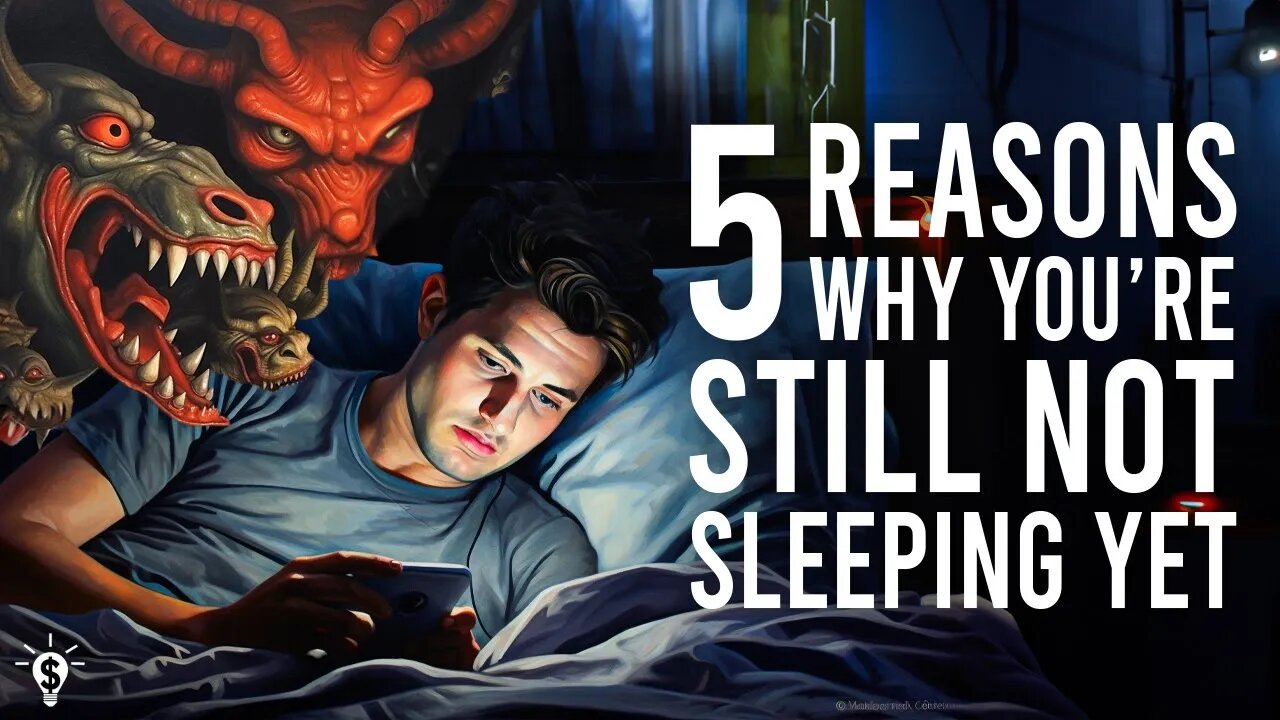Premium Only Content

5 Scientific Reasons Why You're Still Not Sleeping Yet
If you can't remember the last time you had a good night's sleep, you might be falling into some common traps that you're not even aware of. We're going to bust some myths and provide you with actionable steps that'll have you snoozing in no time.
So get ready to face some uncomfortable truths. Lets jump right into the first reason your still not sleeping yet.
Damn man your room is shit (haha)
We often underestimate just how much our surroundings can affect our sleep quality. You might not realize it, but your bedroom could actually be a minefield of sleep-disrupting elements. Let's start with noise. Whether it's the hum of an air conditioner, street traffic, or a snoring partner, unwanted noise can jolt you awake even if you've managed to fall asleep. A white noise machine or earplugs can be lifesavers in drowning out disruptive sounds. Some people even find that calming music or nature sounds help them drift off. Next up—lighting. Our bodies have been wired to respond to natural light patterns. Bright lights signal to our brains that it's time to wake up and be active, while darkness triggers the release of melatonin, a hormone that promotes sleep. So get rid of any bright clocks, and opt for blackout curtains or a sleep mask to keep your room dark. You'd also be amazed by how much a cluttered space can stress your subconscious. A messy room can make you feel anxious and restless. So do yourself a favor, tidy up your sleep space; it might just be the calming influence you need to drift off into a peaceful slumber. And it doesn't stop there. Even the temperature in your room can make or break your sleep. Ideally, you'd want to aim for a slightly cooler room for the best sleep quality. We'll dive more into that in our bonus tip! So go ahead, turn your bedroom into a haven of tranquility. Block out noise, dim those lights, keep it cool, and get rid of distractions. And yes, that means putting your phone away! Once you make these adjustments, you'll realize the change in your sleep quality is like night and day.
Reason Number 2 – Oh boy You're Overthinking. The second reason many of us struggle with sleep is the notorious habit of overthinking. We've all been there: lying in bed, staring at the ceiling, with our minds racing like crazy. You're replaying conversations from the day, worrying about tomorrow's to-do list, or stressing over a big project at work. It's a vicious cycle; the more you think, the more awake you become. The truth is, these thoughts act like caffeine for your brain—keeping you alert when you should be winding down. Overthinking not only makes it difficult to fall asleep but also severely impacts the quality of sleep you do get. You might wake up feeling like you barely slept at all, and that's because your brain was busy all night long. So how do you break the cycle? Mindfulness and meditation techniques have shown to be incredibly effective in helping to clear the mind and prepare the body for a restful sleep. Apps like Headspace or Calm offer guided sleep meditations that you can follow along with. It's like having a personal meditation coach right in your bedroom. Another strategy is to jot down your worries or to-do list for the next day on a piece of paper before you hit the bed. This act alone can psychologically free you from the burden of holding it all in your mind, allowing you to let go and drift off. Some people also find that gentle stretching or yoga right before bed helps them clear their minds and focus on their physical sensations rather than their swirling thoughts. So, the next time you find yourself caught in a whirlpool of thoughts when you should be sleeping, remember to try out these techniques.
But overthinking isn't your only obstacle to a good night's sleep. Let's explore other habits that might be standing in your way. Moving on to Reason 3: Bad Evening Habits. We've all been there—telling ourselves it's just one more episode or just a few more minutes of scrolling through Instagram. But guess what? These seemingly innocent habits can wreak havoc on your sleep quality. First off, let's talk about blue light. Your screens—whether it's your TV, laptop, or smartphone—emit a type of blue light that has been shown to suppress the secretion of melatonin, the hormone responsible for sleep. In simpler terms, blue light tricks your brain into thinking it's daytime, making it harder to unwind and fall asleep. Multiple studies have shown that reduced exposure to blue light at least an hour before bedtime can significantly improve both the quality and duration of sleep. Next, let's tackle that late-night snacking habit. Eating heavy or sugary foods before bed can cause discomfort and indigestion, making it difficult to fall asleep. Your body has to work harder to digest, which means it can't focus entirely on rejuvenating you for the next day. But all is not lost.
-
 8:18
8:18
MattMorseTV
3 hours ago $3.88 earned2.2 MILLION in ONE YEAR.
12.6K84 -
 14:37
14:37
Colion Noir
6 hours agoCanadian Police Chief Urges Citizens To Comply With Home Invaders And Hide
44.4K61 -
 LIVE
LIVE
OVERKLOC
1 hour ago🔴LIVE - CHILL SUNDAY GAMING - WHO KNOWS WHAT WE'LL PLAY
38 watching -
 LIVE
LIVE
FrizzleMcDizzle
3 hours agoNightReign - Lies of P: Overture after - Come hang out
25 watching -
 1:18:54
1:18:54
Jeff Ahern
4 hours ago $10.27 earnedThe Sunday Show with Jeff Ahern
51.2K6 -
 32:05
32:05
Tactical Advisor
4 hours agoNew Thermal Target for the Military | Vault Room Live Stream 038
39.9K2 -
 2:00:33
2:00:33
GamerGril
3 hours agoThe Evil Within 2 💕 Pulse Check 💕 Still Here
11.8K1 -
 LIVE
LIVE
ttvglamourx
7 hours ago $1.45 earnedPLAYING WITH VIEWERS !DISCORD
113 watching -
 5:59:31
5:59:31
TheManaLord Plays
9 hours agoMANA SUMMIT - DAY 2 ($10,200+) | BANNED PLAYER SMASH MELEE INVITATIONAL
27.1K1 -
 LIVE
LIVE
Jorba4
4 hours ago🔴Live-Jorba4- The Finals
72 watching